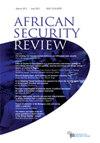Experiences of community policing forum members in liaison with SAPS, private security and community members regarding community policing
IF 1.1
Q3 INTERNATIONAL RELATIONS
引用次数: 0
Abstract
ABSTRACTCommunity policing plays a pivotal role both nationally and internationally in the reduction of crime. The purpose of this study is to highlight how community policing forum (CPF) members experience community policing in liaison with the South African Police Service (SAPS), private security and community members in the South West Tshwane policing area in Gauteng, South Africa. One-on-one interviews were conducted with 36 participants, purposively sampled from the Laudium, Lyttelton and Wierdabrug police precincts. Observations were also made in the different policing precincts. The data were thematically analysed. The results show that, owing to a variety of factors, the police alone cannot reduce crime in communities. A multidisciplinary approach is recommended wherein CPFs, private security firms and community members work together to mobilise their expertise and resources with the aim of attaining a safe and secure living environment for all citizens.KEYWORDS: community policing forums; collective efficacy; neighbourhood watch; community policing; criminal behaviour Disclosure statementNo potential conflict of interest was reported by the authors.Notes1 South African Government, Constitution of the Republic of South Africa; South African Government, South African Police Service Act No. 68 of 1995.2 Collins Dictionary, ‘Community Policing’.3 Everbridge, ‘What Is Community Policing?’.4 Community-Policing-Definition-community-policing, 2023.5 Fleming, ‘Community Policing’.6 Cossyleon, ‘Community Policing’.7 Kuo and Shih, ‘Evaluation of a Community-Oriented Policing Program’.8 Fleming, ‘Community Policing’.9 McMurtry and Curling, Review of the Roots of Youth Violence (Vol. 3).10 Mbhele and Singh, ‘Criminological Exploration’.11 Moshood et al., ‘Role of the National Drug Law Enforcement Agency’.12 Wantenaar, ‘Criminological Perspective’.13 Ibid.14 ‘Centurion Crime Hotspots Identified’.15 Koch, ‘Joint Multi-disciplinary Operation’.16 Cohen and Felson, ‘Social Change’.17 Wantenaar, ‘Criminological Perspective’.18 Przeszlowski and Crichlow, ‘Exploratory Assessment’.19 Wantenaar, ‘Criminological Perspective’.20 Pala and Balcioğlu, ‘Community Policing in England, Wales, and European Union’.21 Joint Committee on Justice and Equality, Report on Community Policing and Rural Crime.22 Garcia and Polson, ‘Community Policing Relations’.23 Joint Committee on Justice and Equality, Report on Community Policing and Rural Crime.24 Ibid.25 Ibid.26 Weisburd and Majmundar, Proactive Policing,27 Everett Police Department, ‘Block Watch Program’.28 Conway, ‘Near or Far Away’.29 Ibid.30 Ristmäe, Estonian Neighbourhood Watch.31 Kocak, Rethinking Community Policing.32 Leishman, ‘Koban’.33 Ibid.34 Spasić and Radovanović, ‘Security Needs’.35 Skilling, ‘Community Policing in Kenya’.36 Ibid.37 Ordu and Nnam, ‘Community Policing in Nigeria’.38 Ibid.39 Vancouver Police Department, Community policing, 2020.40 ‘Neighbourhood Watch Scheme’.41 Vancouver Police Department, Community policing, 2020.42 South African Police Service, Submission of the Annual Report.43 South African Government, South African Police Service Act No. 68 of 1995.44 Van Niekerk and Bezuidenhout, ‘Perceptions of South African Police Service Officials’.45 Ibid.46 Mothibi and Phago, ‘Efficacy of Government Strategies’.47 Buthelezi, ‘Sector Policing’.48 Ibid.49 Malatji, ‘Evaluation of the Effectiveness of Community Policing Forums’.50 Wagner et al., Doing Social Research.51 Wantenaar, ‘Criminological Perspective’.52 Ibid.53 South African Government, Constitution of the Republic of South Africa; South African Government, South African Police Service Act No. 68 of 1995.54 Wantenaar, ‘Criminological Perspective’.55 Ibid.56 South African Government, South African Police Service Act No. 68 of 1995.57 Wantenaar, ‘Criminological Perspective’.58 Ibid.Additional informationNotes on contributorsAngelique Antoinette WantenaarAngelique Wantenaar – Senior Criminal Investigator at the South African Revenue Services. She started her career in the Military where she qualified as a Telecommunicator in the South African Defence Force (Airforce). She then moved on to Military Intelligence where she then became an Officer. She joined South African Revenue Services (SARS) in 2003. She continued her career doing criminal investigations relating to Income Tax, Vat and Customs Investigations. She studied Criminology where she obtained BA, Honours and master's degrees in criminology.Doraval GovenderDr Doraval Govender is currently a professor extraordinarius at the University of South Africa (UNISA). He underwent many educational, training and development programmes both internationally and nationally including the FBI programme for International students in Quantico, USA (199th session). He has also served as the President of the FBI Middle East, Africa Chapter for the FBI re-trainer session from 2001 to 2005. In 2009, he joined the University of South Africa (UNISA) as a lecturer in the Department of Criminology and Security Science. Since 2009, he has published articles in journals, book chapters, conference proceedings and a book in 2018. He is presently supervising masters and doctorate students at UNISA and serves as examiner for masters and doctorate students nationally and internationally. To date he has supervised many postgraduate students until completion. He served as editor of the Acta Criminologica Journal and as an editorial board member of several journals, including international journals. He was also the founding editor of the Southern African Journal of Security, managed by UNISA Press. He has chaired sessions at many different conferences and has presented papers both internationally and nationally on safety and security related issues. Doraval has a doctorate degree in Criminology (specializing in Security management), Mtech degree in Forensic Investigations, Honours degree and a bachelor's degree in Policing and a Diploma in Education, Training and Development. He was the Chair of the College of law Ethics Review Committee at UNISA from 2016 until 2018. He is also an NRF rated researcher.社区警务论坛成员就社区警务事宜与警察、私人保安及社区成员联络的经验
2009年,他加入南非大学(UNISA),担任犯罪学与安全科学系讲师。自2009年以来,他在期刊、书籍章节、会议论文集上发表了文章,并于2018年出版了一本书。现任南洋理工大学硕士生、博士生导师,并担任国内外硕士生、博士生主考官。迄今为止,他已经指导了许多研究生直到完成。他曾担任《犯罪学报》(Acta criminjournal)的编辑,并担任多家期刊(包括国际期刊)的编辑委员会成员。他也是由UNISA出版社管理的《南部非洲安全杂志》的创始编辑。他曾在许多不同的会议上主持会议,并在国际和国内发表了关于安全和安保相关问题的论文。Doraval拥有犯罪学博士学位(专门从事安全管理)、法医调查硕士学位、警务荣誉学位和学士学位,以及教育、培训和发展文凭。2016年至2018年,他担任UNISA法律伦理审查委员会学院主席。他也是NRF评级研究员。
本文章由计算机程序翻译,如有差异,请以英文原文为准。
求助全文
约1分钟内获得全文
求助全文

 求助内容:
求助内容: 应助结果提醒方式:
应助结果提醒方式:


